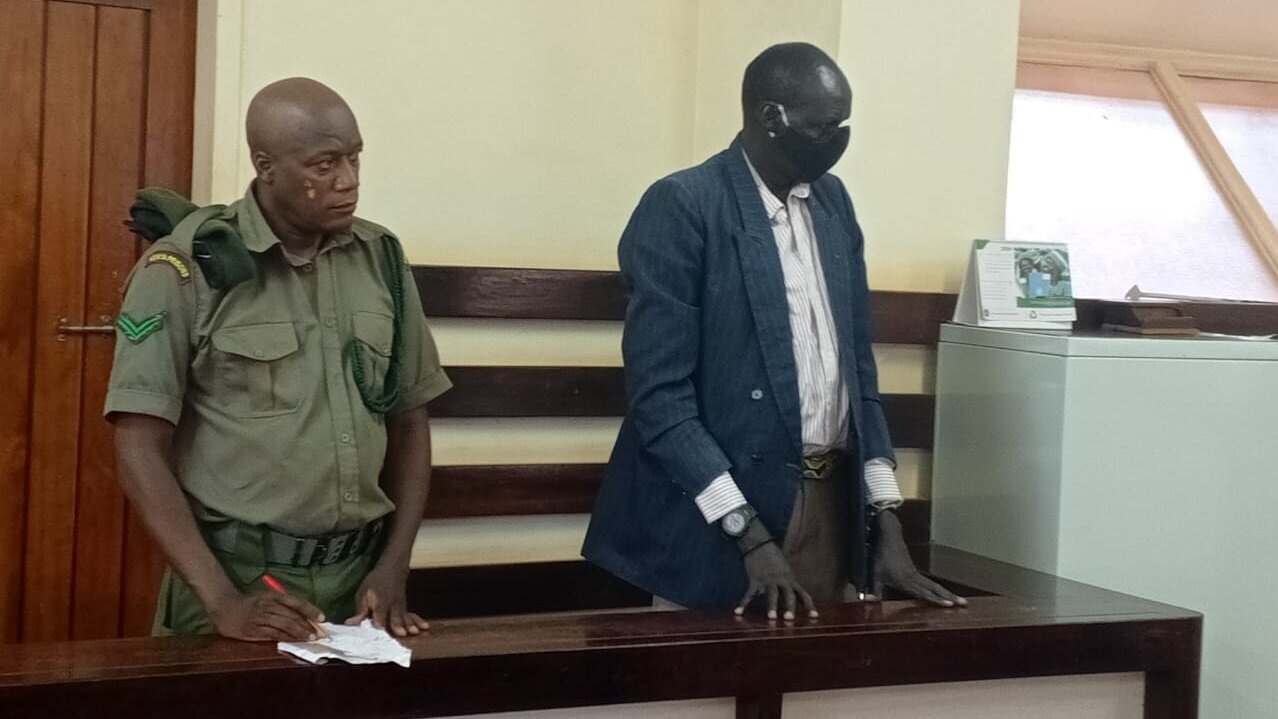Security guard to spend 30 years in jail for killing Isiolo activist

Patrick Naweet (right) who was jailed for 30 years for killing a human rights activist. Photo/Gerald Kibaki
A security guard who stabbed Isiolo-based human rights activist and convicted of murder, has been sentenced to 30 years in prison.
Meru High court Presiding Judge Edward Murithi said on Thursday the prosecution had proved beyond reasonable doubt that Patrick Naweet, had killed Elizabeth Ekaru.
The court found the guard was guilty of the offence of murder contrary to section 203 and 204 of the Penal Code.
"Pursuant to section 333 (2)of the criminal procedure code, the sentence of 30 years shall commence on January 17, 2022, the date when he was arraigned in court," Mr Murithi said.
He committed the offence on January 3, 2022, where he killed Ekaru, a human rights activist. The two(2) had a land border dispute.
The accused lured the deceased to the land after the two(2) had attended burial of a neighbour.
Justice Murithi added that Naweet should not have taken matters into his own hands and would have resolved the dispute in a dignified manner where each has an opportunity to be heard in accordance with the law.
Mr Murithi said the accused ought to be held in custody for deterrent reformation and community protection objectives.
Naweet had told trial judge that he had no intention of killing Ekaru, but only acted in self defense.
"I have listened to submission from the counsel of the accused, the counsel for DPP and the counsel for the family and the court has also considered the mitigation by the offender and I do not agree that the circumstance was so aggravated to call for the death sentence, the maximum sentence for the offence of murder," Mr Murithi said.
Defence lawyer Hillary Mugambi passionately asserted Naweet’s innocence, claiming that the act was an act of self-defence provoked by circumstances.
Zainab Kombo, representing the deceased’s family, stood resolute as the lead counsel.
Prosecution Counsel Erick Masila painted a vivid picture of the crime scene, emphasizing the excessive force used by the accused.
The multiple injuries inflicted on Ekaru’s thighs and hands, he argued, indicated that she had desperately shielded herself from repeated attacks.
Mr Murithi said the court also considered the breadwinner status of the accused against the complete orphanage by his action, the five(5) children of the deceased who had earlier lost their father to banditry.
He said the circumstance of the case warranted a custodial sentence and being cognisant that the counsel of the accused asked for a lenient jail term.
"The appropriate sentence must be one which communicates to the offender and others that result in killing a neighbour male or female with whom one(1) has a land boundary dispute is abhorrent and contrary to all principles of civilised modern living consistent with an open society based on rule of law and respect for human rights recited in the article 10 of our constitution," Mr Murithi said.
The judge added the accused should be in custody for his own protection.
The defence invoked customary law, urging the court to consider the context where men oppress women, an argument Mr Masila dismissed as unreasonable.
He maintained that the excessive force employed by Naweet was neither necessary nor reasonable.
Mr Mugambi countered, suggesting that manslaughter, not murder, should be the charge.
According to him, the accused had been choked by the deceased before resorting to his weapon. He criticized the incomplete police investigation regarding the disputed land ownership.
Witness Vincent Mutua, a DCI officer, provided crucial evidence.
His photographs captured the aftermath of the incident, revealing a blood-stained knife hidden in the thicket.
Dr Mohammed Abdikadir, who conducted the postmortem, testified about Ekaru’s extensive injuries.
Her brain had a 10cm-deep wound, her thigh a 20cm cut, and her right hand another wound.
Major blood vessels were affected, leading to fatal bleeding.
